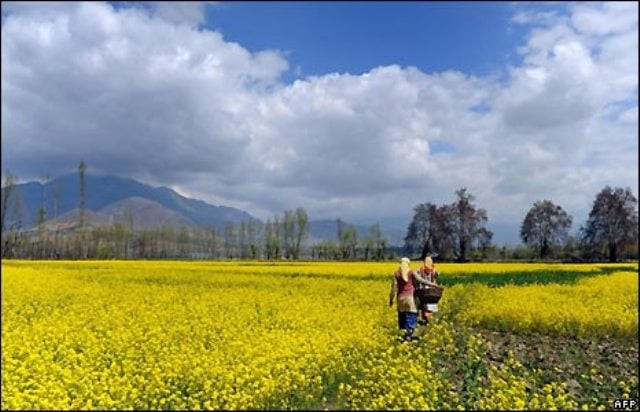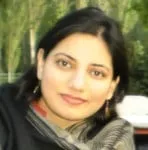Will this movement work and why did it become non-violent now after almost 18 years of being so active?
My personal interest in the programme came from being indoctrinated since childhood (from Zia’s state media) that ‘Kashmir is an integral part of Pakistan’ and that ‘Kashmir will one day become Pakistan’ (because it was always ‘meant’ to be). And because I am a Kashmiri myself, ‘so-called’ Kashmiri that is, I share nothing of what the ‘real’ Kashmiris are made of except the skin tone, the taste for food, the love of Kashmiri tea (which we call namkeen chai) and the admiration for pashmina shawls.
I was conveyed this rather blatantly by a ‘real’ Kashmiri I made friends with in the UK last Ramazan. The only attributes unfortunately given to Kashmiris in ordinary Pakistani circles are those of being beautiful people who make great food and who love to eat. This generalisation is usually true but I was pleased to see that the ‘real’ Kashmiris are far beyond food and the desire to look good. I suppose more because generally people in Kashmir would be fair-skinned and everyone would see putting sugar in Kashmiri tea as an atrocity! (Traditionally, the pink Kashmiri tea is cooked with salt and not sugar as is commonly done in Pakistan.)
My new Kashmiri friend was a medical doctor who was outspoken, brave and I must say rather proud of being a Kashmiri. Her family had a big orchard in held Kashmir and came from a well-to-do, educated background. I was so fascinated by the fact that I was meeting a ‘real’ Kashmiri that my inquisitive mind started brimming with questions. I asked her to tell me about life in Kashmir in 2011, what the Kashmiri people wanted now, and whether they want to join Pakistan.
To the last question she said ‘no’. Infact she added cautiously that Kashmiris would be better off without being with Pakistan. After three wars having been fought between Pakistan and India over Kashmir and with nothing having worked out so far, this response did not come as a surprise.
Here’s what my Kashmiri friend ‘A’ told me:
“Kashmiris are tired. We are a whole generation that has grown up in fear and violence. We have all lost brothers or relatives or near and dear ones in the freedom movement. Now we don’t want the same violence for our children. We don’t want to be with Pakistan, we just want our own independence.”
When I asked her out of curiosity whether her new country will be able to survive on its own, she said that her people will work it out and that they just need their chance.
After hearing her harrowing account of being pulled off her medical university’s bus, where she was ordered to raise her arms to be searched and she refused along with several other disturbing details, I thought that she was such a brave woman. This mother of two children was a Kashmiri whose bravery radiated through her words. It was more important for her to guard her honour and to have courage. Sure she said she was very scared when such incidents happened. There were several times when she thought she would be shot and killed by the Indian forces. But she lived through it all to be able to decide that she didn’t want this for her children.
When Yasin Malik was repeatedly asked by the TV host why he had shifted to a non-violence movement, I wondered why he didn’t give the same reasoning that ‘A’ gave me. Yasin Malik has just had a baby daughter. Maybe family life has softened him to see the other realities of life. There is no parallel or substitute to freedom. Claiming it through reason and patience may shift the goal of the leadership of Jammu Kashmir Liberation Front further away, but at least they will be giving peace a chance too.
As a Pakistani Kashmiri with ancestors from Srinagar, I can perhaps never understand or be able to gauge the density of pain that the Indian Kashmiris have lived through and possibly live through even today. But above, all as a human being who believes in peace, I feel that it is time that the strongest words be used now as methods of mass communication to show the world who these beautiful people are. They are the ‘real Kashmiris’, the fore runners in the desire to have peace. And they want to be heard.
Last year on my English Eid, a friend invited all the community Pakistanis to her house for a one-dish get together. ‘A’s’ family and another Indian family were also there. I couldn’t help overhearing the conversation between ‘A’ and the Indian guest near the Kashmiri tea tray.
‘A’ poured out a cup to the Indian man.
“Will you take sugar or salt?”, she asked.
“What do you normally take?”, he asked.
“Originally it’s taken with salt”, she told.
“I’ll take whatever is original then”, he smiled and concluded with a pinch of salt in his pink tea.
If only ‘people’ could rule the world.
Read more by Ammara here
Join us on Facebook for blog updates and more!



COMMENTS (150)
Comments are moderated and generally will be posted if they are on-topic and not abusive.
For more information, please see our Comments FAQ